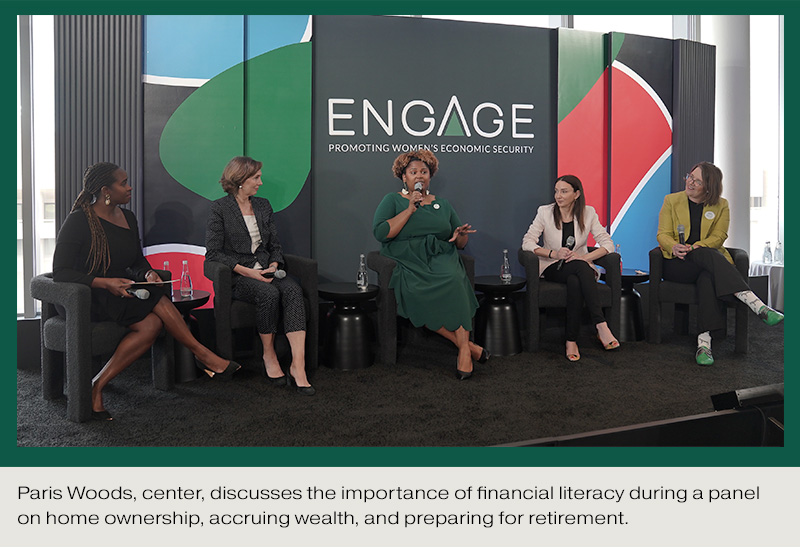Issue spotlight. Women-centered. Reliable facts. Edition 10

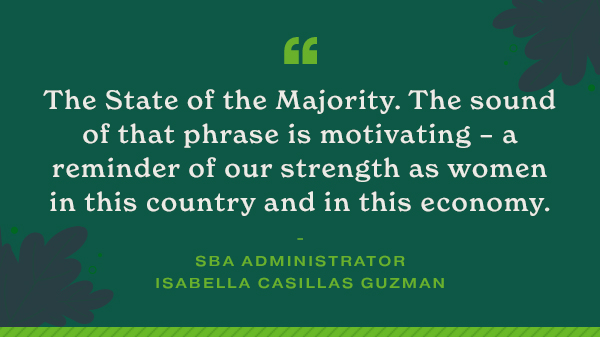


Dear friends,
April is my favorite month of the year – the sun is shining, the calendar is full, and the tulips are blooming from every patch of grass in DC. It presents the perfect environment to reflect, plan, and dream – for Team Engage, that has meant reflecting on last month’s State of the Majority Summit and how the conversations there will shape where our organization moves for the remainder of 2023.
This edition of The Thread celebrates the dynamic, remarkable individuals who joined us for our State of the Majority Summit, and we begin by highlighting the recipients of our first-ever Engage Woman Awards. When selecting honorees, our team looked at leaders who are working to help women thrive and break down barriers to financial security by identifying innovative solutions in the public and private sectors. These women are truly remarkable, and we were thankful to have the chance to applaud their leadership, creativity, and tenacity.
Next, we launch into a discussion on what we heard at the State of the Majority Summit and the trends that stood out in these energizing conversations. This year’s Summit was titled “The State of the Majority” because Women Outnumber, Outvote and Outlive Men.™ The agenda of our Summit was inspired by the “thread” of a woman’s life, during which factors within and outside her control determine her ability to achieve economic security. Our Summit panels covered topics including early childhood development and education, raising resilient and competitive girls, women in STEM, post-secondary education, adult literacy, workforce preparedness, recruiting and promoting women, the motherhood penalty, childcare, home ownership, and preparing for a secure retirement.
We were amazed by the wide range of feedback we received after the Summit, which showed us that there isn’t just one standout issue that the Engage Woman is focused on. Each topic discussed at the Summit presented a unique perspective on where we’ve been, where we are now, and where opportunity exists to move forward to a landscape where women can thrive. Our full State of the Majority Summit Agenda, the biographies of our speakers, and a video recap from the day can be found below.
We don’t want to miss the chance to host you for our next Engage gathering. If you haven’t already, please join our mailing list here!
Whether you were sitting front row or are just hearing about our Summit for the first time, we hope this compilation of thought-provoking and encouraging takeaways leaves you feeling enlightened and informed on what is happening in the public and private sectors to promote women’s economic security and called to partner with us on the road ahead.
Let’s Engage together!
Toby
Toby Douthat is the Executive Director of Engage. She would love to connect with you – please reach out to toby@engagewomen.org.
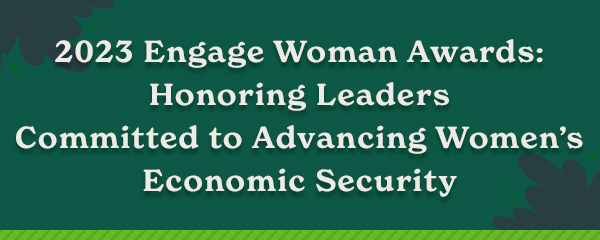

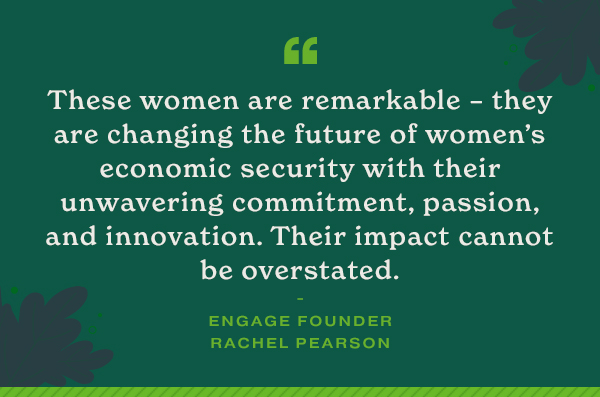
Engage kicked off our Summit festivities with a Remarkable Women Reception and Dinner to present the inaugural Engage Woman Awards. The Engage Woman Awards recognize the contributions of female leaders who have demonstrated excellence and commitment to addressing barriers to women’s economic security in public service, corporate leadership, nonprofit leadership, and congressional staffing.
Following the presentation of our awards, we were fortunate to hear a thought-provoking conversation on the importance of access to childcare for small business owners and employees between SBA Administrator Isabella Casillas Guzman and Senator Joni Ernst moderated by Annmarie Hordern, Bloomberg TV’s Washington Correspondent.
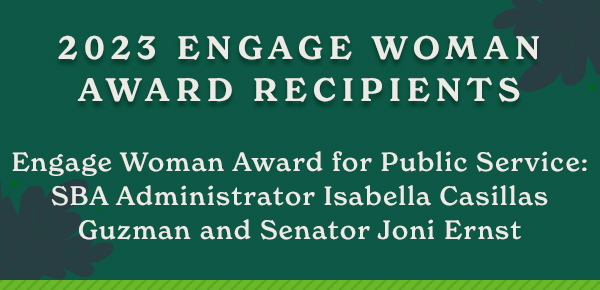

“You see the [impact of childcare access] in multiple aspects affecting small businesses. Because workers can’t afford to get childcare, they’re not coming in consistently or they’re quitting. You’re not able to participate in the workforce. That’s detrimental because there’s a tight labor market, and we need all of our workers to be at full capacity.” –SBA Administrator Isabella Casillas Guzman
Administrator Guzman leads the U.S. Small Business Administration with a commitment to breaking down barriers that inhibit the ability of women to achieve the American Dream. One such challenge is access to childcare – Administrator Guzman highlighted a recent study that states women ages 29 to 44 are more likely to leave the workforce or reduce their hours because of childcare. The SBA is working to address this disparity by supporting entrepreneurial childcare centers with increased access to capital and strategic planning. Administrator Guzman highlighted the fact that women – especially women of color – are starting businesses at three times the rate as men, and there is vast opportunity to modernize the way SBA operates to cut red tape and make sure that regulations are appropriately scaled for small businesses. Under Administrator Guzman’s leadership, the SBA is adding new women’s business centers to make sure that women have the resources, networks, and market access to build small businesses.
“We have set women back by not providing the infrastructure for them to re-engage quickly in the workforce, and it is something that we really do have to focus on.” –Senator Joni Ernst
As the Ranking Member on the Senate Committee on Small Business and Entrepreneurship, Senator Ernst is committed to tackling the pervasive challenges that childcare deserts pose nationwide. The Senator drew from her personal experience raising a daughter in a childcare desert and expressed her optimism on opportunities for progress today, saying “you’ll find that many women in Congress, whether they are Republicans or Democrats, really see [childcare] as an issue, and they understand it. It’s a touch point that has hit many of them in their lives and their careers.” Senator Ernst says the biggest matter of deliberation is how to provide and fund the services, but the end goal is unanimous: we need affordable childcare and safe spaces for our children to go. Senator Ernst partnered with Senator Jacky Rosen (D-Nevada) to introduce the Small Business Child Care Investment Act to “think outside the box” in expanding access to quality, affordable childcare. Engage is watching this bill closely!

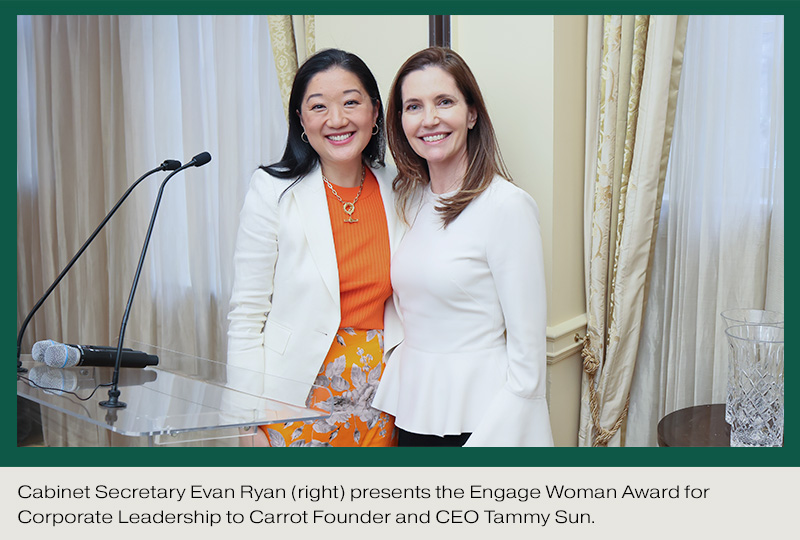
“I fundamentally believe that making fertility healthcare a standard part of compensation and benefits at work is critical to the economic, social, and physical wellbeing of women.” – Tammy Sun
Carrot Fertility Founder and CEO Tammy Sun has, in the words of Cabinet Secretary Evan Ryan, “genuinely upended the way companies think about fertility care – it has totally changed the landscape.” Tammy started Carrot about six years ago to address the disproportionate burden that the cost of fertility care poses to women. Tammy discussed the sobering reality that those without employer-sponsored fertility benefits pay for fertility care out of pocket or with medical loans in an age when medical debt is the number one reason that people file for bankruptcy in the United States. Under her leadership, Carrot has partnered with hundreds of employers, health plans and health systems to support members and their families to ensure that millions more people have access to fertility healthcare.


“Through Women in Training, we realized we’re doing something greater than giving out products to people in need – we’re inspiring change by boldly speaking about our vision to help end period poverty and the shame and stigma associated with it.” –Brooke and Breanna Bennett
Brooke and Breanna Bennett are the Co-Founders of Women In Training, Inc. (WIT), a nonprofit that seeks to alleviate period poverty among the one in five girls in the United States who have missed school due to lack of access to period products. Senator Katie Boyd Britt – who hails from the same hometown as the Bennett sisters – shared that Brooke and Breanna were instrumental in creating and passing legislation in Alabama that allocates funding to provide grants for female hygiene products to Alabama students in Title I schools. Alabama is only the seventh state in the nation to mandate free period products for students. Brooke and Breanna invited attendees to join them in helping end period poverty in the United States by supporting responsible legislation to address period poverty on the state and federal level.

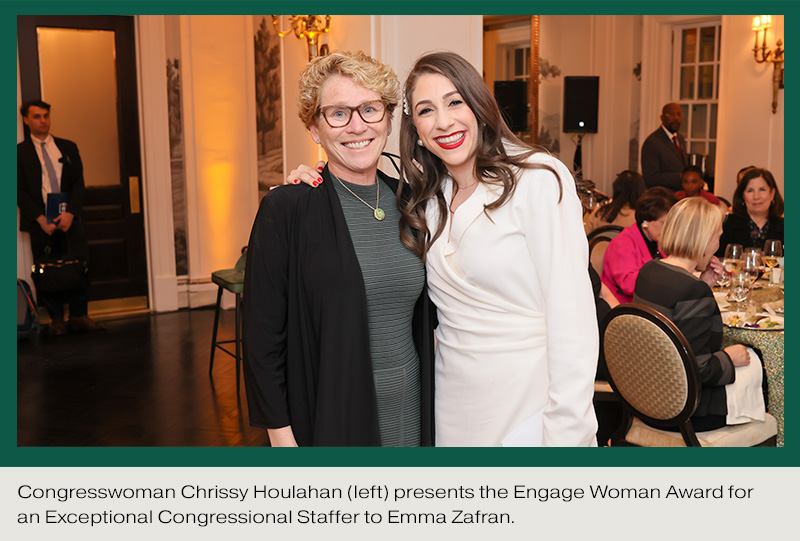
“Being a staffer on Capitol Hill can be hard, but to me it is the most meaningful and creative act of public service. I get to come to work every day with a sense of hope and vision for the world I want to build and be a part of, and bipartisanship is a key component of this reality.” – Emma Zafran
Emma is the Senior Legislative Assistant for Congresswoman Chrissy Houlahan and has played a critical role in the formation and growth of the House Bipartisan Paid Family Leave Working Group, the Women in STEM Caucus, and countless other legislative efforts that champion women and families. Emma shared that she wrote her grad school dissertation on the lack of paid leave the United States and couldn’t have imagined at the time that she would be recognized in part because of her work assisting in the creation of the aforementioned paid leave working group, an endeavor Engage has been a proud partner in. According to Congresswoman Houlahan, Emma has boundless energy and “fights every day to make sure that we have strong advancements for women and for women’s economic security.”

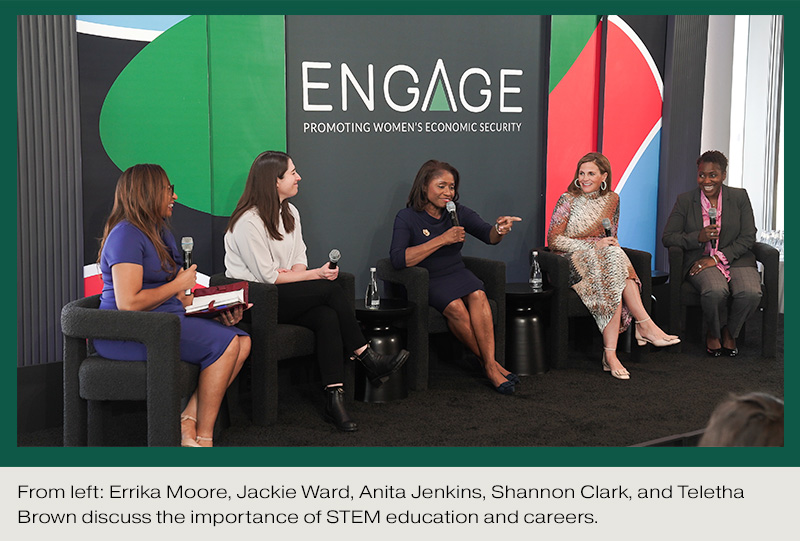
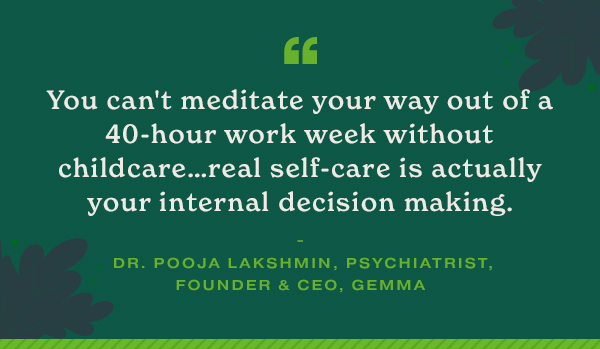
Engage would like to extend our sincerest gratitude to those who brought unique perspectives, deep experience, and refreshing honesty to the important discussions at our first State of the Majority summit. Together, we took an honest look at the experiences so many women live throughout the economic thread of their life that impact their ability to achieve their own definition of financial prosperity and prepare for a dignified retirement. Let’s look back at what we discussed!

The insightful conversations between our expert panelists and moderators reaffirms the reason for the State of the Majority Summit: convening a diverse group of accomplished women with expertise in the private, public, and non-profit sectors to inspire concrete actions women can take to advance women’s economic security.
During the Summit, organizational leaders and elected officials emphasized the importance of practicing what they preach when it comes to creating opportunities for women they work with. They acknowledged that they were not always afforded such opportunities themselves, but encouraged women to not wait for them to appear. They urged women to put their fears aside and take necessary next steps in their career, education, or advocating for themselves and the best interests of women widely.
Here are just a few of the moments that captured our attention throughout the day.
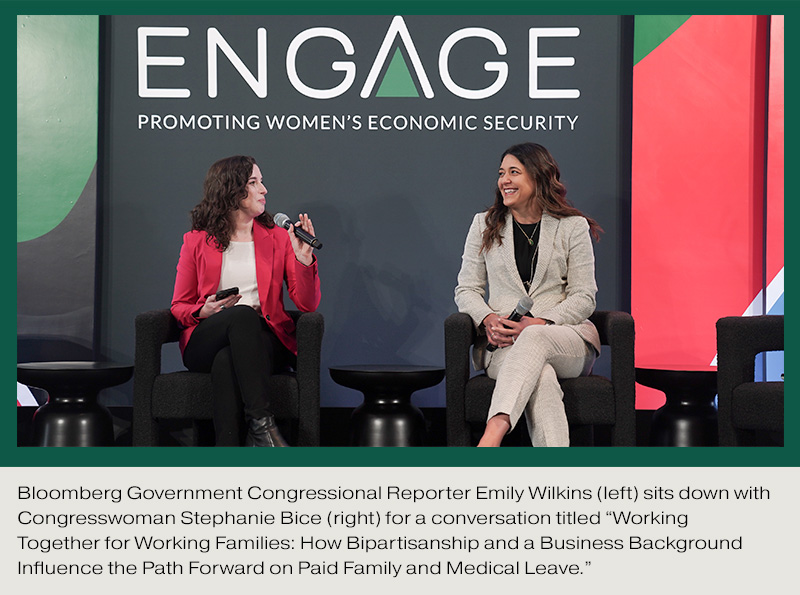
“[Congresswoman Houlahan and I] are on opposite sides of the political spectrum in many ways, but we also have a lot of commonalities. We both have two daughters about the same age, we both had experiences with paid family leave. I was in a role 22 years ago that the company I worked for offered a short-term disability benefit, which allowed me to receive a paycheck for eight weeks after the birth of my daughter, which 22 years ago was almost unheard of. [Congresswoman Houlahan] almost separated from the military because there was no family leave benefit at the time. We were both on [the House Armed Services Committee] last year, and we partnered together to look at providing paid family leave for our military families. We were able to get that across the finish line, and that’s when we were approached to look at doing this on the federal level. Certainly there are challenges, but our perspective is we want to look at this from a clean slate…And now’s the time. Is it going to be easy? No, it’s not. But [Congresswoman Houlahan] and I both recognize that this is something that if you were to poll the average majority of our constituents, they would say that it’s time for this to happen.”
Congresswoman Stephanie Bice
R – Oklahoma
“The early care and education system is what allows parents to go to work. It’s what supports this critical period of child development.”
Katie Hamm
Deputy Assistant Secretary, Office of Early Childhood Development, Administration for Children and Families, U.S. Department of Health and Human Services
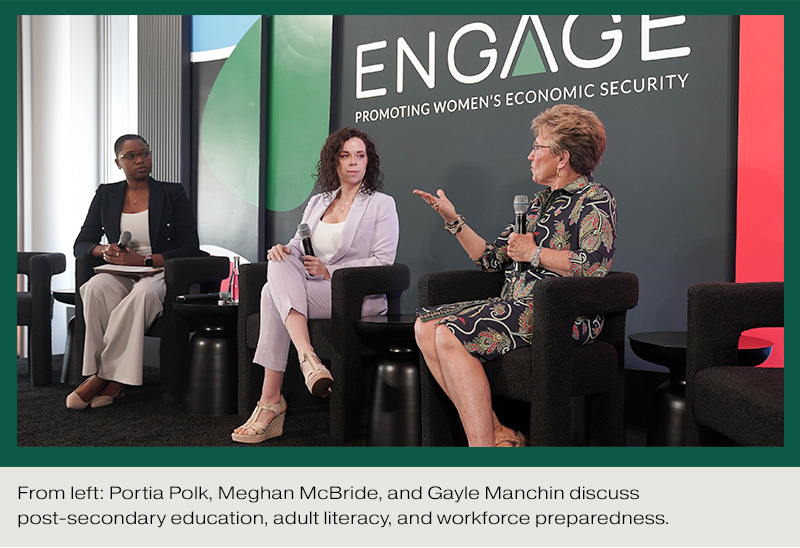
“You have a lot of isolation in poverty. Community colleges have really stepped up to the plate, educating our young people that going on for further education did not specify one academic institution. I think that has encouraged women. I think community colleges in smaller rural areas have empowered and enabled women to start going to classes.”
Gayle Manchin
Federal Co-Chair, Appalachian Regional Commission
“Higher education is what gave me access to the workforce…Having dropped out of school, gotten a GED, having been a teen mom, I was told I did not belong in college and that I had ruined my life. The way I found my way to ultimately get a doctorate degree is by going to a technical college – that’s where I got my start. Then I went to a community college, and that’s where I learned that I did belong in college. Even though I failed in high school and dropped out, I could do it and I did belong. And that led me to working in workforce development where I help other high school dropouts find their way into the workforce by helping them access post-secondary education when they thought they didn’t belong.”
Dr. Meghan McBride
Alumni Advisor to the Board, Coalition on Adult Basic Education
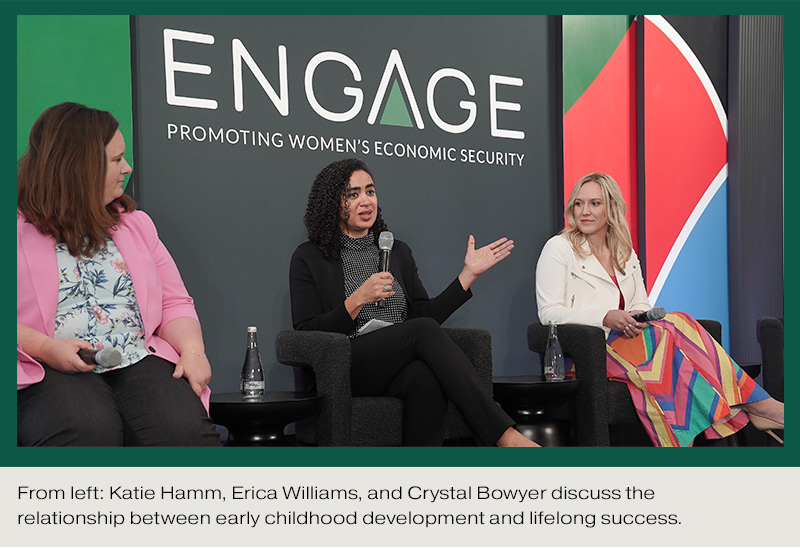
“I know there are so many female leaders in the room here that are employing other women too. I think demonstrating, having that balance with your own family, is really important.”
Crystal Bowyer
President & CEO, National Children’s Museum
“It’s so important to build confidence from a young age…[children] may want to try something, they may be good at it, and that may be their passion and you don’t even know it. I think it’s important to allow children to try new things, to allow them to grow, to dream – ultimately, that’s how you grow strong.”
Jennifer King
Assistant Running Backs Coach, Washington Commanders
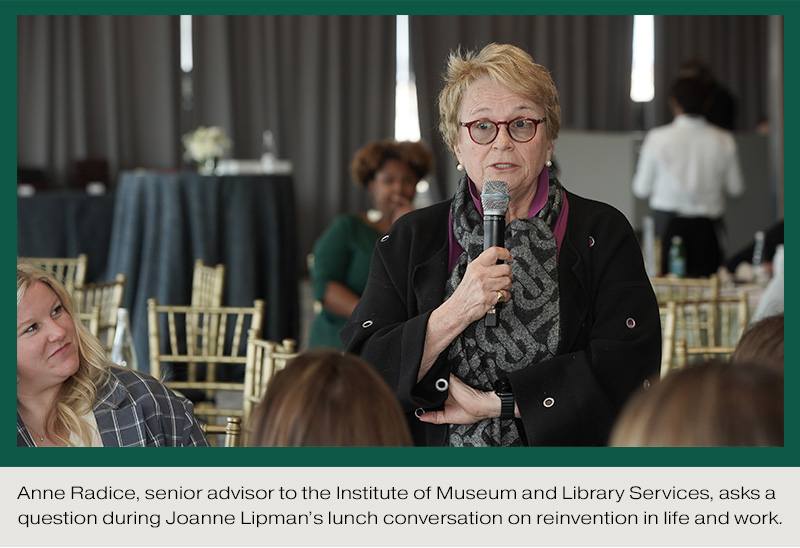
“Seeing is believing. [Women] need to be able to see what’s out there and what’s available to them. We really need to broaden the scope of what we think about what STEM includes.”
Shannon Clark
Senior Vice President, Federal, R+D, Palantir
“It’s okay to say, ‘I want you to have a seat at the table’. It’s different to invite [someone] and say, ‘this is your seat!’”
Teletha Brown
Director, Strategic Business Transformation, Johnson & Johnson
“There are 43 million Americans who are low-literate, and more of them – 63 million nearly – are low-skilled in numeracy. That can make it very hard to enter the workforce. 60% of our [adult learners] are not in the workforce. The good news is employers are coming to us looking for a workforce…adult literacy helps to get people into the workforce.”
Dr. Meghan McBride
Alumni Advisor to the Board, Coalition on Adult Basic Education
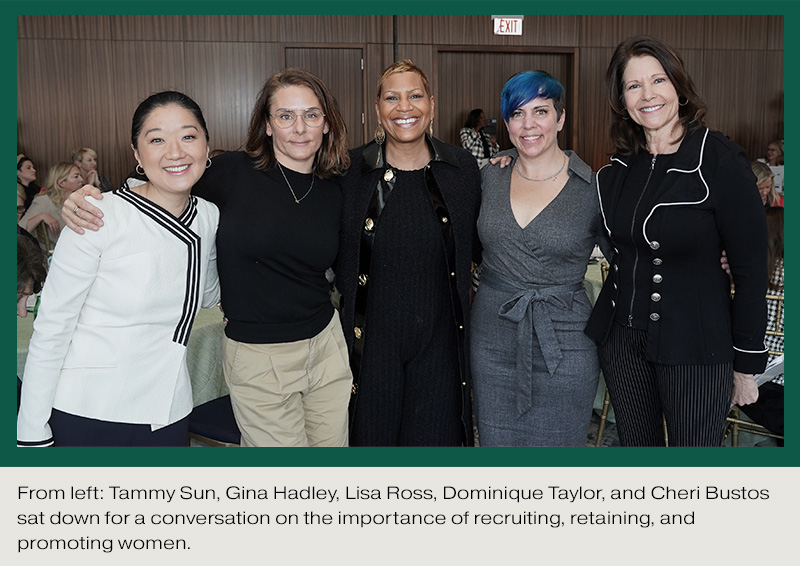
“One of the things that the dumpster fire of all of us working at home showed us was that the workplace is actually very broken…If we are going to retain women, we need to figure out how to work differently with them in different stages of their careers…We’re in it. We can’t continue to talk about the future of work. This is a moment in which we have to embrace what happened in the past and figure out how, if we’re going to retain this critical female expertise, how we work flexibly.”
Gina Hadley
Co-Founder, The Second Shift
“The post reproductive working life of women is important, and it’s not just important morally – it’s important to businesses. Women in their forties, like myself, in their fifties, these are your most experienced managers, your most experienced leaders, and thinking about how to retain them, continue to invest in them, make sure that they have the healthcare that they need…This is really, really important for the future of work and the future of how we think about talent.”
Tammy Sun
Founder and CEO, Carrot
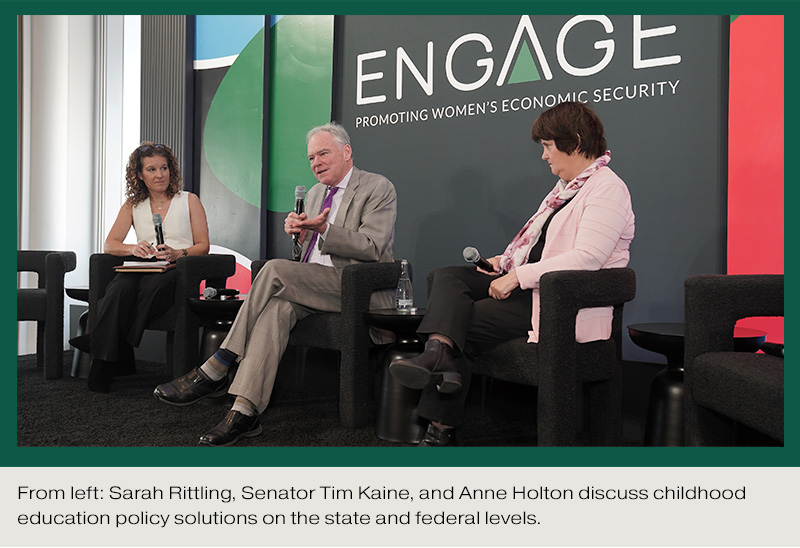
“I’ve learned often in politics that a passionate minority beats a tepid majority every time.”
U.S. Senator Tim Kaine
D – Virginia
“You can’t meditate your way out of a 40-hour work week without childcare…real self-care is actually your internal decision making. About your career, about who you choose as a partner, about whether you’re going to have kids or not, and then how you’re going to raise those kids. It’s threaded through every single decision that you make in your entire life and your economic security. This is why Engage is brilliant, right? Because it’s like all of these threads – mental health, economic security, childcare, paid leave – everything comes together. It’s all part of the pie.”
Pooja Lakshmin
Psychiatrist, Founder & CEO, Gemma

One of our panelists remarked that the crowd at our Summit was impeccably dressed, but the audience wasn’t the only aspect of the day that was on trend. Two messages flowed through the entirety of the day: resilience is critical and bipartisan solutions have always been, and will continue to be, challenging and necessary work.
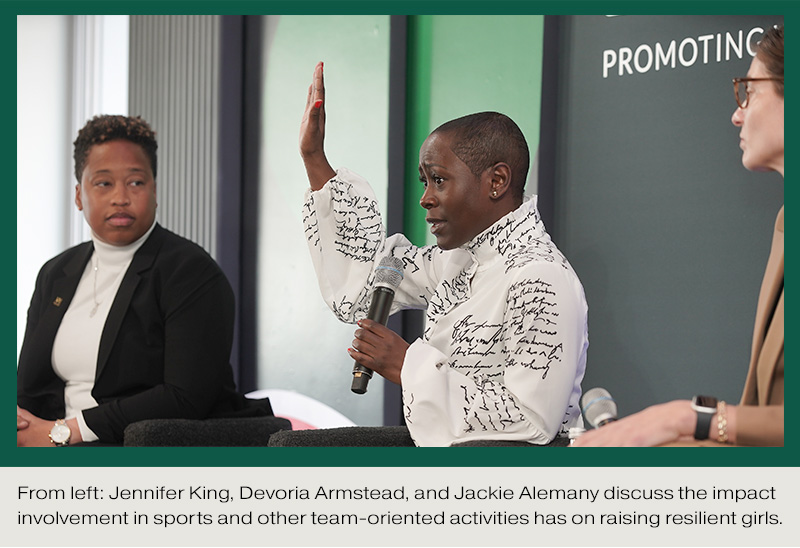
Resilience is Critical
Engage dedicated a full panel to the importance of raising resilient, mentally-strong girls, but the topic did not stop there. During the State of the Majority address, SBA Administrator Isabella Casillas Guzman detailed the powerful role women play in our economy and what could be accomplished with policies that harness the resilience of woman in small business, saying “there is nothing more powerful than the grit and determination of an entrepreneur who has her sights set on an idea and is working hard every day to deliver her vision.”
Washington Post Congressional Investigations Reporter and accomplished athlete Jackie Alemany reminded the room of political and professional competitors about the resilience skills gained when you lose. “Losing instills confidence too,” Jackie told our audience, nodding in agreement. “It teaches you this idea that even if you lose, you’re still on the team, you are still a contributing member, and you still have another chance to get out there, do better, and learn from that loss.”
During the panel on education and STEM, Howard University Hospital CEO Dr. Anita Jenkins shared her story of being the only woman on a leadership board alongside 23 men where she powered through debates over cost to ultimately convince them to prioritize upgrades to digital mammogram technology. She shared a message that so many of us know to be true: “We have to be in the room where it happens.”
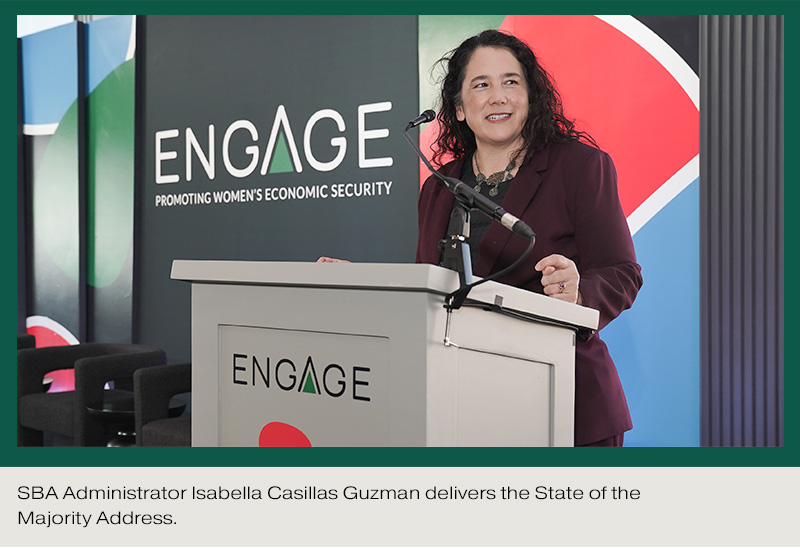
Bipartisan Solutions Have Always Been – and Will Continue To Be – Challenging, Necessary Work
At the core of Engage is a commitment to identifying and elevating bipartisan, commonsense solutions to barriers to women’s economic security, and our Summit discussions reflected the importance of this approach and the realities of bipartisanship in today’s world.
In the opening fireside chat, Congresswoman Bice, one of the Co-Chairs of the Bipartisan Paid Family Leave Working Group, was honest with the room about the challenges of passing a paid family leave policy: “Now’s the time. Is it going to be easy? No, it’s not.” But her words came with a fresh resolve as well. Congresswoman Bice spoke to the working group’s efforts to learn from the “uphill battles” that came with passage of the Family Leave Act 30 years ago. “It took them seven years to get paid FMLA across the finish, so we’re looking at how we can learn from the past,” she reminded the room. For more on the Paid Family Lead Working Group, check out our Q&A with the Co-Chairs in our last issue of The Thread.
Administrator Guzman also celebrated bipartisan policy battles won by reminding the room that this year marks the 35th anniversary of the signing of The Women’s Business Ownership Act which helped to level the playing field for female entrepreneurs by ending laws that required women to have a husband or male relative cosign a business loan. Administrator Guzman said we can’t let another 35 years pass before making progress: “together, as a majority, [women] can get things done. Our democracy and our economy really depend on it.”
During the panel on the motherhood penalty and childcare, Adrienne Schweer, Director of the Bipartisan Policy Center’s Paid Family Leave Project, shared the news of a more recent bipartisan success – the passage of the Pregnant Workers Fairness Act in late December. “Congress finally passed a law that has been worked on for decades. It should have been done a decade ago,” she said of the law that expands the rights of pregnant and nursing women.
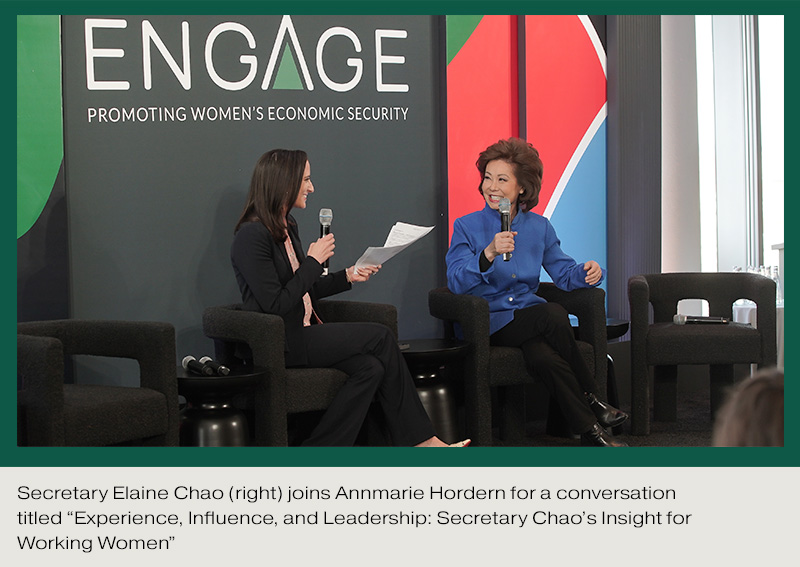

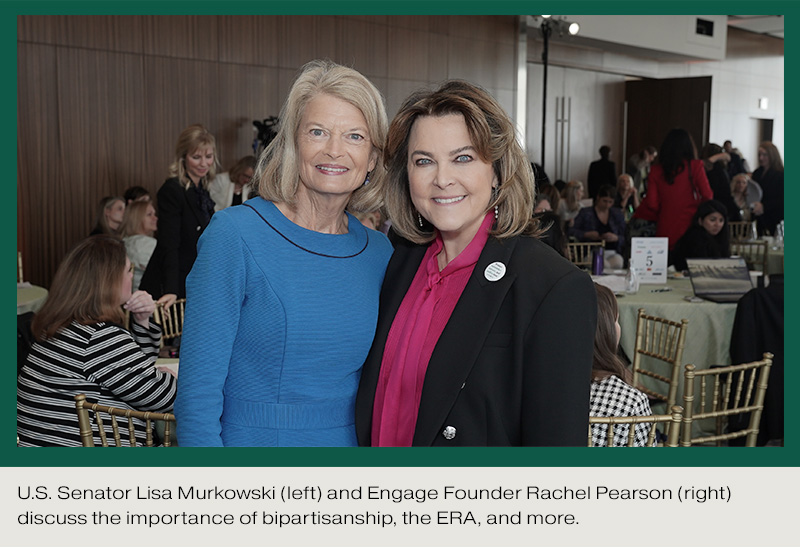
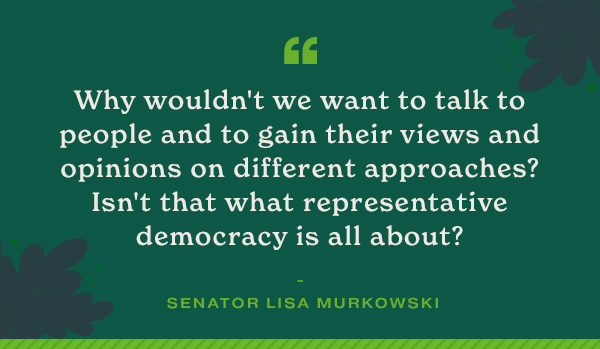
In introducing Alaska Senator Lisa Murkowski as the Engage Hero of the Year, Engage Founder Rachel Pearson told the audience “there will not be a commonsense solution passed in the United States Senate unless this woman is at the table.”
Both of Senator Murkowski’s recent elections required the pursuit of paths less traveled. In discussing her challenging 2010 write-in campaign, Senator Murkowski explained the process of getting 103,000 Alaskans to learn to spell her name correctly so they could write it in on the ballot. In her most recent election in 2022, Senator Murkowski faced a ranked-choice voting system and secured yet another election victory. Senator Murkowski spoke about how these unusual campaign circumstances have made her a better leader who considers all views:
“There needs to be more proactive democracy when it comes to how we select those who represent us, and I think that’s where ranked choice can take you. It’s not perfect. Believe me, I had my reservations about it when Alaska first embarked on this, but what it did to me as a candidate, what it required me to do is to approach a campaign through the lens of ‘I have to build coalitions because I cannot win a plurality without coalitions.’”
Senator Murkowski also discussed lessons our nation can learn from the ranked-choice voting system in Alaska:
“Why wouldn’t we want to talk to people and to gain their views and opinions on different approaches? Isn’t that what representative democracy is all about? Not just those who align themselves with a party label? So do not automatically discount how ranked choice may actually be one of these election reforms that could make a difference in making our elections more civil by allowing outcomes that are more broad based.”
Engage looks forward to what challenges this formidable bipartisan force will take on to support and promote economic security for American women. Senator Murkowski’s firm comments in support of he Equal Rights Amendment indicated that issue will continue to be a priority for her: “It is pretty basic in ensuring that our Constitution provides for those equal rights, which we all assume that women have or should have. It’s pretty fundamental to me. It is so unfortunate in my view that it has become the partisan initiative, that it has now become a Republican vs. Democrat initiative.This is about equality for women wherever you are.”
Engage is boundlessly inspired by and grateful for leaders like Senator Murkowski whose philosophy of governing prioritizes progress over politics, and we’re confident we need more leaders like her.


Engage was fortunate to hear from a few incredible authors on our 2023 Summit panels, and we cannot recommend their work enough. Weaved throughout each of these books is a personal narrative that shares how each woman’s lived experience has inspired a desire to equip others with tools to achieve lifelong health and financial prosperity – two of Engage’s key pillars.
by Pooja Lakshmin, MD
Reading Real Self Care feels like sitting with a friend, counselor, coach, and mentor all at once. We were fortunate to hear some of Dr. Lakshmin’s revolutionary insights on our Motherhood Penalty and Childcare Summit panel, and her book breaks down even more of her teachings on the impact social systems have on us as well as how to identify sustainable, authentic, personalized self-care. Dr. Lakshmin presents evidence-based, clinical expertise to equip women with what they need to develop a routine that aligns with their needs, values, and boundaries while busting the myth that caring for yourself is selfish. The most refreshing part of this book is the emphasis on self-compassion, her personal anecdotes, and her truly fabulous sense of humor. Dr. Lakshmin teaches readers that taking care of your mental, physical, and emotional health equips you to show up for those you love – and for yourself.
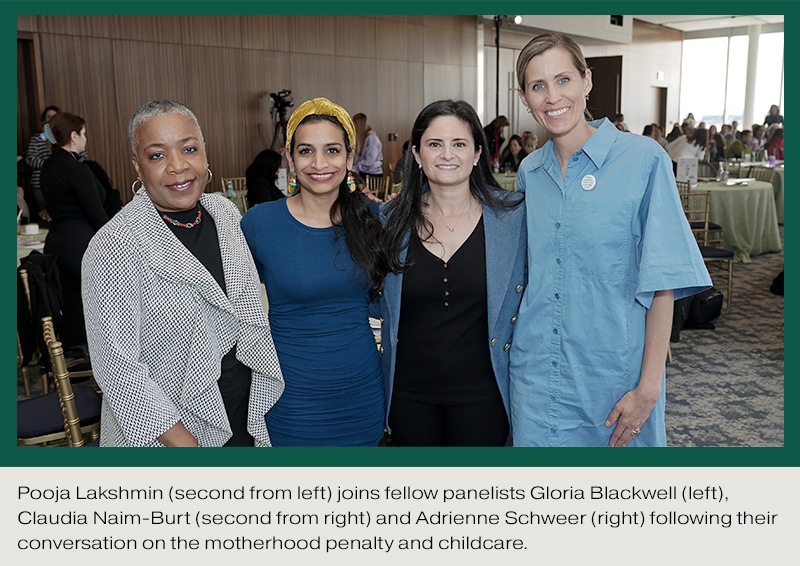
by Joanne Lipman
Resilience was a topic of conversation through the entirety of our Summit and was at the forefront of Joanne Lipman’s lunch conversation on her brand new book. This inspiring read draws from extensive research and hundreds of interviews to discuss effective leadership, career transitions, the benefits of lifelong learning, navigating change, the importance of diverse perspectives, and why we should embrace change in order to achieve success. Joanne’s powerful book ends with a toolkit with practical advice on how readers can cope with and even thrive in times of transition. You’ll have to snag a copy yourself for her full list of expert advice, but one of our favorite suggestions was to make a “CV of failure” to help realize where you’ve been “trying to fit into the wrong mold” as a means of encouraging you to “pivot in a more fulfilling direction.” Whether you are in or approaching a season of transition yourself or are simply seeking tools to become a more resilient individual, Next! has critical guidance to help you maneuver the “Reinvention Roadmap.”
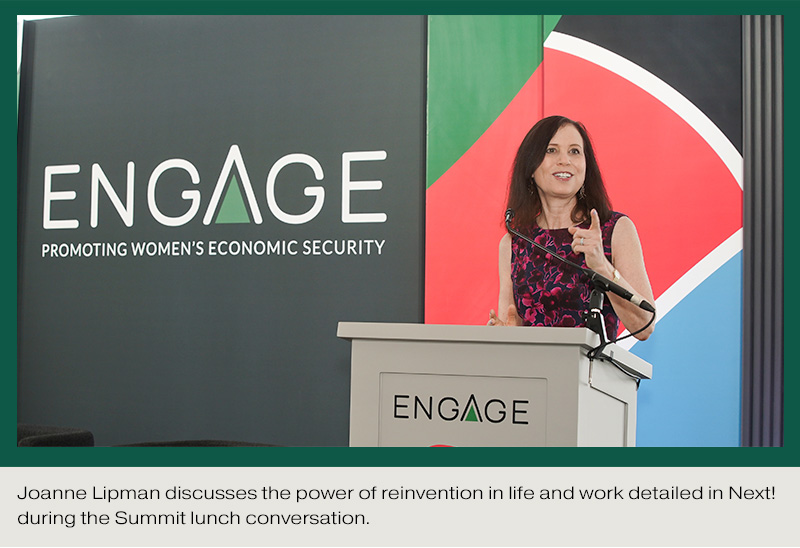
by Paris Woods
The passion Dr. Woods has for equipping Black women with the tools needed to take charge of money and achieve financial prosperity becomes more and more evident as you read The Black Girl’s Guide to Financial Freedom. Her book is an essential read for any woman who seeks to learn more about budgeting and investing, build generational wealth, prepare for retirement, and truly achieve financial freedom. Dr. Woods emphasizes the importance of financial literacy, a topic she discussed during her panel at the Summit, and equips readers with practical tools for specific situations such as buying a car or going to college. With personal stories, extensive research, and inspiring positivity woven throughout, The Black Girl’s Guide to Financial Freedom makes it clear that it is never too late to pursue and achieve financial freedom.
